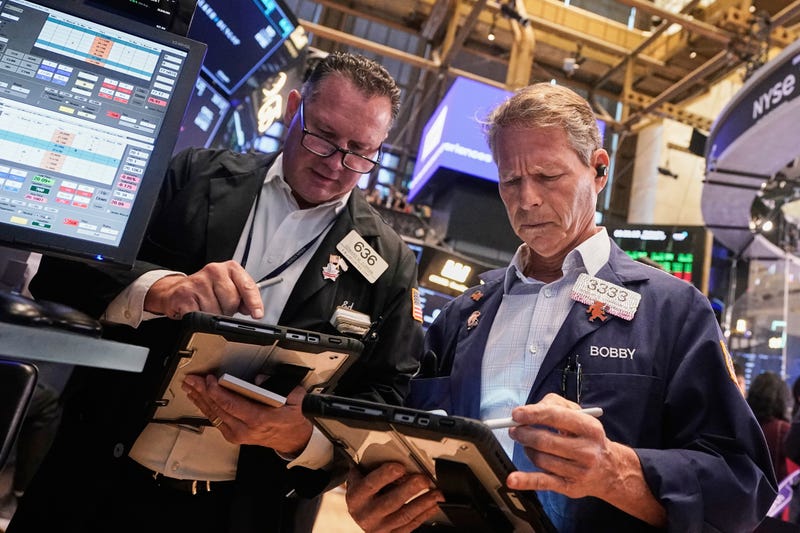
NEW YORK (AP) — Wall Street stumbled to a third straight loss on Thursday as U.S. stocks gave back more of their big gains for the year so far.
The S&P 500 fell 0.5% and marked its longest losing streak in more than a month. The Dow Jones Industrial Average dropped 173 points, or 0.4%, and the Nasdaq composite sank 0.5%. All three indexes are still near their records set at the start of the week, though.
Stocks felt pressure from reports showing the U.S. economy may be stronger than economists thought. While that’s encouraging news for workers and for people looking for jobs, it could make the Federal Reserve less likely to cut interest rates several times in the coming months.
The Fed just delivered its first cut of the year last week, and officials had penciled in more through the end of next year. That was critical for Wall Street after U.S. stocks shot to records since April in large part because of expectations for rate cuts. Easier rates can boost the economy and make investors more willing to pay high prices for stocks and other investments.
But a stronger-than-expected economy could remove some of the Fed’s urgency, particularly because cuts to rates carry the risk of worsening inflation that’s already stubbornly high. If the Fed doesn’t cut rates as often as investors expect, it would empower criticism that the U.S. stock market is too expensive after rising so much, so quickly.
“Buckle up,” warned Jonathan Krinsky, chief market technician at financial services firm BTIG.
Stocks look to be in their most vulnerable position since their April lows given how much complacency has built up and how the rubber band has recently been “as stretched as it gets in some parts of the market,” Krinsky wrote in a research report.
Wall Street’s ultimate hope is that the U.S. economy stays in a delicate balance where it’s slow enough to convince the Fed to cut rates but doesn't become so weak that it leads to a recession.
Treasury yields ticked higher in the bond market as traders pared bets for the number of upcoming cuts to rates by the Fed. The yield on the 10-year Treasury rose to 4.17% from 4.16% late Wednesday.
One of Thursday’s stronger-than-expected economic reports said that fewer U.S. workers filed for unemployment benefits last week. That could be a signal that the pace of layoffs is slowing.
Another report said the U.S. economy grew at a faster pace during the spring than earlier thought, while a third said orders blew past economists’ expectations last month for U.S. manufactured goods with a relatively long life span.
On Wall Street, CarMax tumbled 20.1% after the seller of used autos reported a weaker profit for the latest quarter than analysts expected. It sold fewer vehicles during the quarter than it had a year earlier. It also was hurt because it increased its expectations for losses from loans made in earlier years.
Jabil fell 6.7% even though it reported a stronger profit for the latest quarter than analysts expected, thanks in part to demand coming because of artificial intelligence. It also gave forecasts for upcoming revenue and profit that topped analysts’ expectations.
Such moves typically send a stock’s price higher, but Jabil came into the day with an already huge gain of 56.6% for the year so far. That was more than quadruple the S&P 500’s rise over the same time.
Another AI winner, Oracle, gave back 5.6%. Earlier this month, it surged to its best day since 1992 after announcing several big contracts signed because of AI.
Starbucks slipped 0.5% after the coffee chain announced a $1 billion plan to restructure, including the closure of stores and the cutting of 900 nonretail jobs.
On the winning side of Wall Street was IBM. It rose 5.2% after HSBC announced a promising trial with IBM of quantum computing in hopes of improving bond trading. The bank said they delivered an improvement of up to 34% in predicting how likely a trade would be filled at a quoted price.
Companies are racing to develop quantum computing in order to solve complex problems beyond the reach of classical computers.
KB Home swung between gains and losses after the homebuilder reported a stronger profit for the latest quarter than analysts expected. CEO Jeffrey Mezger said he was encouraged to see mortgage rates ease through the quarter, which could encourage more potential customers to buy homes.
Mortgage rates have been sinking on expectations for coming cuts to rates by the Fed. KB Home’s stock finished the day with a dip of 0.6%.
All told, the S&P 500 fell 33.25 points to 6,604.72. The Dow Jones Industrial Average dropped 173.96 to 45,947.32, and the Nasdaq composite sank 113.16 to 22,384.70.
In stock markets abroad, indexes dipped in Europe following modest moves across much of Asia.
___
AP Writers Matt Ott and Teresa Cerojano contributed.